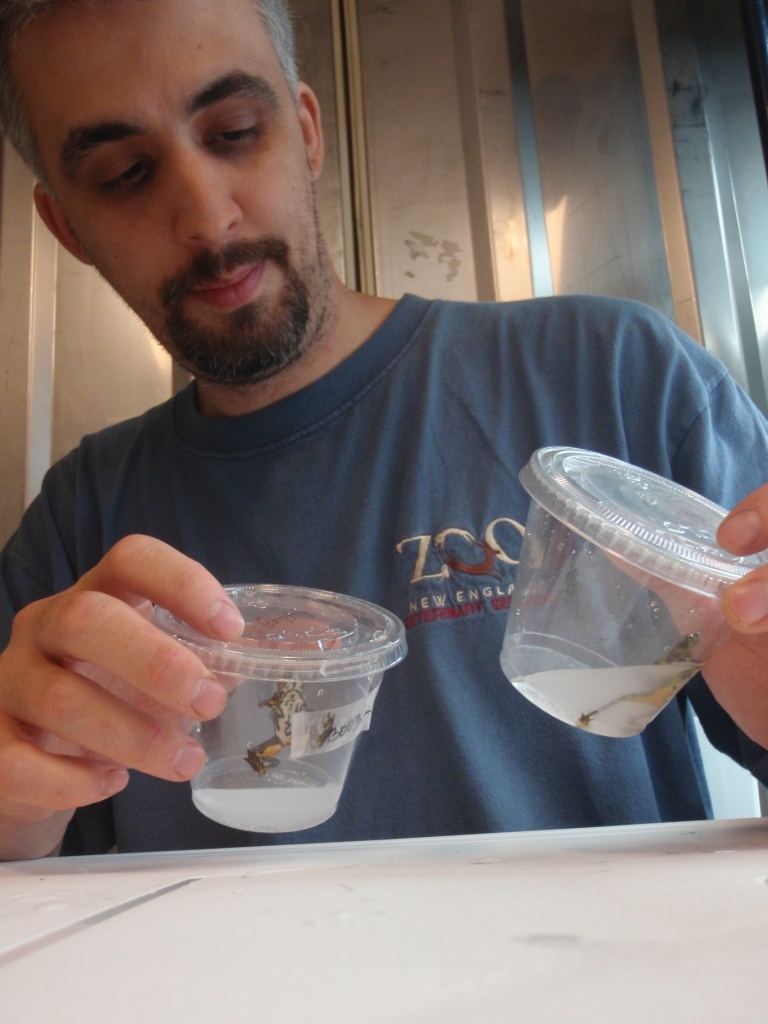
Heska Corporation has selected a proposal from Dr. Eric Baitchman, Zoo New England Director of Veterinary Services, as a finalist for the $25,000 prize in the 2010 Inspiration in Action contest. If Baitchman wins, the money will go to the rescue project. (Photo credit: Zoo New England)
Helping to save amphibians from imminent extinction in Panama is just a click away. Heska Corporation selected a proposal from Dr. Eric Baitchman, Zoo New England Director of Veterinary Services, as a finalist for the $25,000 prize in the 2010 Inspiration in Action contest and online voting is underway.
If selected, the money will support the veterinary efforts of the Panama Amphibian Rescue and Conservation (PARC) Project. Voting is open to the public and the polls are open until 11:59 p.m. MST on Dec. 15, 2010. Visit www.heska.com/action to vote. Heska Corporation, a leading provider of veterinary diagnostic and specialty products, has a core focus on the companion animal market where it strives to provide high-value products and unparalleled customer support to veterinarians.
The mission of the PARC Project, of which Zoo New England is a partner, is to rescue amphibian species that are in extreme danger of extinction throughout Panama. This is a collaborative international project and the efforts and expertise are focused on establishing assurance colonies and developing methodologies to reduce the impact of the deadly amphibian chytrid fungus, Batrachochytrium dendrobatidis, so that one day captive amphibians may be reintroduced to the wild.
As the lead veterinarian for this project, Dr. Baitchman is tasked with developing effective treatment protocols against the chytrid fungus, developing a preventative health and nutrition program for the long-term care of these animals, and training on-site biologists, zookeeper staff, volunteers, and other veterinarians in the principles of amphibian medicine and treatment. Urgent funding is needed for expensive medications used in treatment of chytrid, diagnostic testing, outfitting a laboratory space for diagnostic and treatment work, and travel expenses for veterinarians to Panama.
“This project serves as an example to other amphibian conservation initiatives around the world, particularly in its integrated approach to combine veterinary and conservation sciences,” said Baitchman. “The benefits gained from the veterinary experience and knowledge obtained in working with this project will affect not only wild amphibian species, but will also enhance the profession’s ability to care for captive amphibians in practice, research, and educational collections.”
In the case of the global amphibian crisis, amphibian chytrid disease threatens the entire amphibian class, and in fact some species are disappearing rapidly and have not been seen in the wild in some time. The rate at which species are being lost in this single vertebrate class has not been seen on this planet since the extinction of the dinosaurs 65 million years ago.
The PARC Project currently includes two captive assurance colony sites in Panama, at the El Valle Amphibian Conservation Center, in El Valle de Anton, Panama, and at the Summit Zoo, in the Panama Canal Zone near Panama City, Panama. Experts from ZNE, Africam Safari, Panama’s Autoridad Nacional del Ambiente, Cheyenne Mountain Zoo, Defenders of Wildlife, El Valle Amphibian Conservation Center, Houston Zoo, Smithsonian’s National Zoological Park, Smithsonian Tropical Research Institute and Summit Municipal Park have pooled their energy and resources to form the PARC Project to protect a number of species from complete loss.
Currently at the El Valle site, there are more than 900 animals from 12 different families, represented by 61 different species, including a national symbol of Panama, the Panamanian golden frog, Atelopus zeteki. At the Panama Canal Zone site, there are approximately 180 animals from two different families and eight different species.
Media only: Contact Brianne Barrett, 617-375-9700

